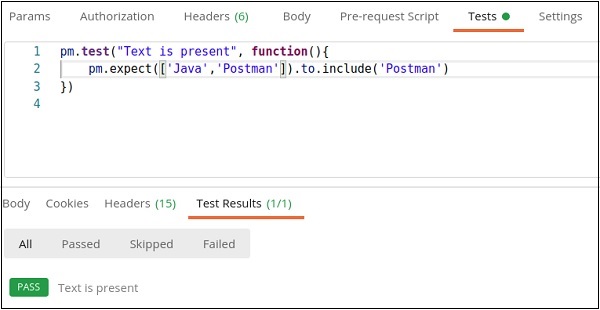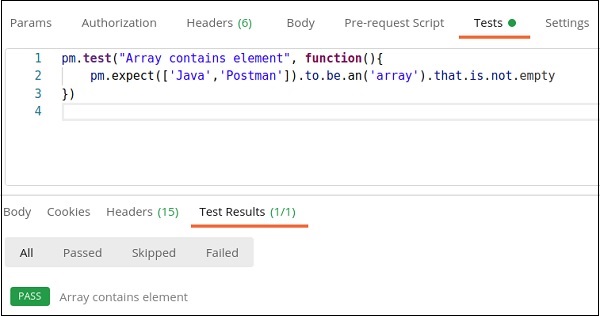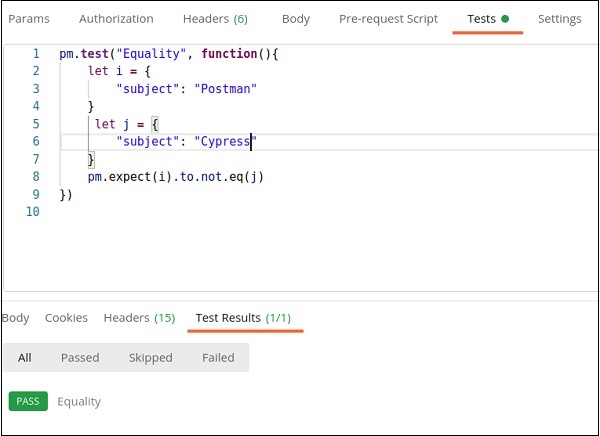
- Postman - Home
- Postman - Introduction
- Postman - Environment Setup
- Postman - Environment Variables
- Postman - Authorization
- Postman - Workflows
- Postman - GET Requests
- Postman - POST Requests
- Postman - PUT Requests
- Postman - DELETE Requests
- Postman - Create Tests for CRUD
- Postman - Create Collections
- Postman - Parameterize Requests
- Postman - Collection Runner
- Postman - Assertion
- Postman - Mock Server
- Postman - Cookies
- Postman - Sessions
- Postman - Newman Overview
- Postman - Run Collections using Newman
- Postman - OAuth 2.0 Authorization
- Postman Useful Resources
- Postman - Quick Guide
- Postman - Useful Resources
- Postman - Discussion
Postman - Assertion
Assertions are used to verify if the actual and expected values have matched after the execution of a test. If they are not matching, the test shall fail and we shall get the reason for failure from the output of the test.
An assertion returns a Boolean value of either true or false. In Postman, we can take the help of JavaScript Chai Assertion Library to add assertions in our tests. It is available in the Postman application automatically.
The Chai − Assertions are easily comprehensible as they are defined in a human readable format. The Assertions in Postman are written within the Tests tab under the address bar.
The documentation for Chai is available in the following link −

Writing Assertions
Let us write an assertion to check if a particular text − Postman is within an array of strings.
Example
pm.test["Text is present"], function(){
pm.expect(['Java', 'Postman']).to.include('Postman')
})
Output
The output is as follows −

Let us write an Assertion to check if an array is empty.
Example
pm.test["Array contains element"], function(){
pm.expect(['Java', 'Postman']).to.be.an('array').that.is.not .empty
})
Output
The output is as follows −

Assertion for Object Verification
Let us write an Assertion for object verification with eql. It is used to compare the properties of the object i and j in the below example.
Example
pm.test("Equality", function(){
let i = {
"subject" : "Postman"
};
let j= {
"subject" : "Cypress"
};
pm.expect(i).to.not.eql(j);
Output
The output is as follows −

The property defined for object i is Postman while the property defined for j is Cypress. Hence, not.eql Assertion got passed.
Assertion Types
In Postman, we can apply assertions on different parts of Response. These are explained below −
Status Code
The assertion for status code is as follows:pm.test["Status Code is 401"], function(){
pm.response.to.have.status(401)
})
The above assertion passes if the Response status code obtained is 401.
pm.test["Status is Forbidden"], function(){
pm.response.to.have.property('status', ' Forbidden')
})
The above assertion is applied on the Response property status having the value Forbidden.
Time taken by Response
The assertion for time taken by response is as follows −
pm.test("Response time above 500 milliseconds", function () {
pm.expect(pm.response.responseTime).to.be.above(500)
})
The above assertion passes if the Response time is above 500ms.
Type of Response Format
The assertion for type of response format is as follows −
pm.test("Response type is JSON", function(){
pm.response.to.be.json;
})
The above assertion passes if the Response is of JSON type.
Header of Response
The assertion for header of response is as follows −
pm.test("Header Content-Encoding is available", function () {
pm.response.to.have.header("Content-Encoding")
})
The above assertion passes if the Response has a header Content-Encoding.
Text of Response
The assertion for text of response is as follows −
pm.test("Response Text", function () {
pm.expect(pm.response.text()).to.include("Tutorialspoint")
})
The above assertion passes if the Response text contains the text Tutorialspoint.